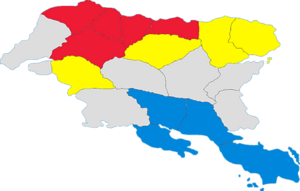Gylian federal election, 2008: Difference between revisions
mNo edit summary |
mNo edit summary |
||
| Line 417: | Line 417: | ||
|- | |- | ||
|colspan=2| | |colspan=2| | ||
|colspan=5|[[File:Gylias-elections-federal- | |colspan=5|[[File:Gylias-elections-federal-2008-D.svg|center|300px]] | ||
|-style="background:#e9e9e9;" | |-style="background:#e9e9e9;" | ||
!colspan=2 rowspan=2 style="text-align:left"|Parties and blocs | !colspan=2 rowspan=2 style="text-align:left"|Parties and blocs | ||
Latest revision as of 07:09, 26 October 2021
| |||||||||||||||||||||||||||||||||||||||||||||||||
All 500 seats in the Chamber of Deputies 251 Chamber of Deputies seats seats needed for a majority | |||||||||||||||||||||||||||||||||||||||||||||||||
|---|---|---|---|---|---|---|---|---|---|---|---|---|---|---|---|---|---|---|---|---|---|---|---|---|---|---|---|---|---|---|---|---|---|---|---|---|---|---|---|---|---|---|---|---|---|---|---|---|---|
| Turnout | 95,0% | ||||||||||||||||||||||||||||||||||||||||||||||||
| |||||||||||||||||||||||||||||||||||||||||||||||||
 | |||||||||||||||||||||||||||||||||||||||||||||||||
| |||||||||||||||||||||||||||||||||||||||||||||||||
Federal elections were held in Gylias on 22 January 2008, to elect the 500 members of the Chamber of Deputies.
Kaori Kawashima led the Liberal Union to its largest plurality since the 1960s, and formed a coalition government with the Progressive Alliance.
Electoral system
The Chamber of Deputies was elected through single transferable vote, using the Droop quota and 5-member circonscriptions, drawn by Elections Gylias based on regional populations.
Parties were not allowed to nominate more than one candidate per seat. Candidates were not allowed to serve in the Senate simultaneously.
Parties
Background
Mathilde Vieira announced in 2007 that she wouldn't run for re-election, bringing an end to an 18-year tenure that had made her the second longest-serving Prime Minister of Gylias. Her place as the Liberal Union's leader was taken by Kaori Kawashima after an internal election.
The Progressive Alliance similarly saw the retirement of its long-serving foresitter Édith Champion, who was replaced by Nese Pelad. The retirement of two major figures in 1990s-2000s politics brought a degree of excitement to the campaign, as the public anticipated the end of the "liquid Parliament" era that Mathilde had inaugurated.
While the economy had receded somewhat from the heights of the 1990s, it still registered a healthy performance, with average growth during Mathilde's final term of 3%.
Campaign
Kaori experienced a surge in popularity during the campaign, a phenomenon nicknamed "Kaorimania". Several factors fueled this phenomenon, including her youth and good looks (which she had expertly capitalised on since her time in the Mişeyáke City Council), her positioning as a "left Donatellist" (which attracted voters that had grown weary of Mathilde's centrist tendencies), and her status as a style icon. Commentators noted that she also implicitly harnessed positive stereotypes of Miranian Gylians.
The fact that National Bloc leader Eiko Fujimura was also Miranian Gylian led some in the public and media to perceive the campaign as a showdown between the two, who had similarly elegant personalities but represented opposite electoral blocs. Eiko's "time for a change" theme, so emphasised in the previous election, was downplayed this time, as it risked backfiring on her since the LU and PA now had new foresitters, while she had been at the helm of the NB for nearly a decade.
Results
In accordance with electoral law, the results were embargoed until the full counting and transfers were completed, and were released all at once on 25 January.
| Parties and blocs | Chamber of Deputies | |||||
|---|---|---|---|---|---|---|
| FPV | % | ± | Seats | ± | ||
| Liberal Union | 3.216.935 | 22,2% | 80 | |||
| Non-inscrits and independents | 3.072.028 | 21,2% | 216 | |||
| Progressive Alliance | 2.999.575 | 20,7% | 70 | |||
| National Bloc | 2.985.084 | 20,6% | 68 | |||
| Centre Group | 2.014.207 | 13,9% | 64 | |||
| Union for Freedom and Prosperity | 130.416 | 0,9% | 2 | |||
| Revolutionary Rally | 57.963 | 0,4% | 0 | |||
| Front for Renewal of Order and Society | 14.491 | 0,1% | 0 | |||
| Total | 14.490.700 | 100% | — | 500 | — | |
| Registered voters and turnout | 15.398.111 | 95,0% | ||||
Analysis
Buoyed by "Kaorimania", the LU won its largest plurality since the Liberation War: 80 deputies. Its first preference vote of 22,2%, an improvement of 1%, still remained below its 1960s record.
For the first time since 1990, the Non-inscrits did not win a plurality of first preference votes, although they remained the largest bloc in Parliament with 216 deputies, 20 less than four years prior. The PA's gain of one seat continued the holding pattern it had largely been in since the 1990s. The gains of the National Bloc and Centre Group collectively amounted to a meager 9 deputies, and a 0,5% increase in first preference votes.
The end of the "liquid Parliament" era was reflected on the map, which had no ties for the first time since 1962. The LU achieved an unforeseen result by obtaining a plurality in Mişeyáke, mainly on the back of Kaori's strong ties to the region and popularity. The NB managed to gain pluralities in Ḑarna and Aðuna, while finishing second in Tomes and Herlan due to strong non-inscrit performances, particularly from the People's Party for a Flourishing Nightlife and Pirate Party.
Aftermath
The new Parliament was sworn in on 1 February 2008. The Kaori Kawashima government was formed, a coalition of the Liberal Union, Progressive Alliance, and Independent Regional Alliance for Minorities.
Eiko was disappointed with the poor gains made by the NB in three elections. She considered resigning, but stayed on until the 2010 regional and municipal elections, whose similarly mediocre results convinced her to step down. She was succeeded by Stéphanie Daniau after a primary election.


